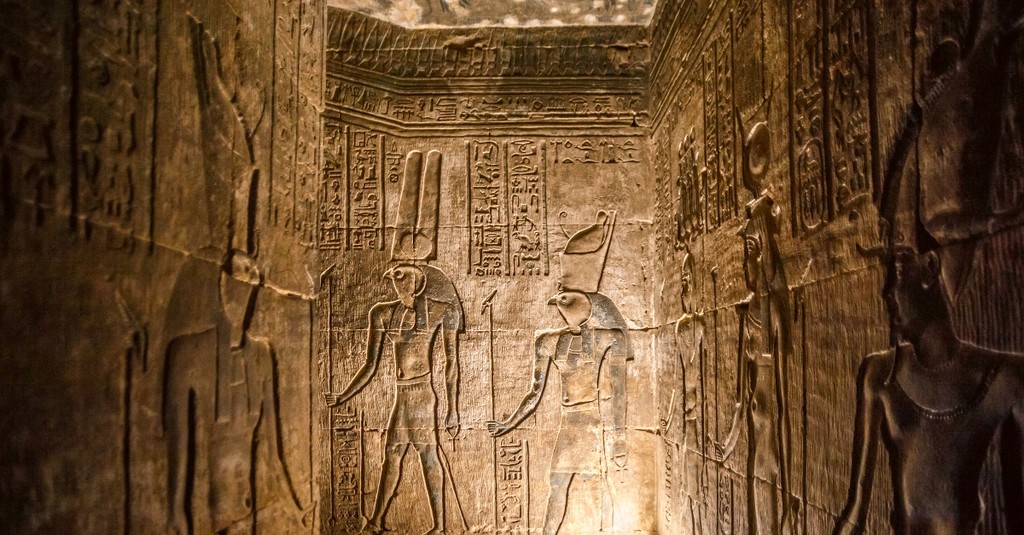This Ask Roger article may feature insights from Roger's wife, Dr. Julie Barrier, co-founder of Preach It, Teach It, worship minister, concert artist, and adjunct professor at Golden Gate Baptist Theological Seminary, or his daughter, Brie Barrier Wetherbee, a sought-after Bible teacher and conference speaker, author, analyst, and Christian theologian.

Dear Roger,
My Bible study group is working through the book of Revelation. I keep noticing that many of the plagues God sends during the Tribulation sound like the plagues He unleashed on Egypt during Pharaoh’s time. What does that mean? Were the Egyptian plagues some kind of prophecy?
Thank you, Ed
Dear Ed,
The ten plagues of Exodus and the Tribulation are eerily alike. Let’s take a moment to consider the parallels.
Both sets of plagues are sent by God as judgments on earth. They show us several important truths about God’s nature.
First, God uses suffering and judgment to bring men back to Himself. A father punishing his child may say, “Son, this hurts me more than it does you.” Executing judgment on mankind grieves God’s heart. But God is holy, righteous, and just. Therefore, wickedness cannot go unpunished.
Next, God is all-powerful. We can’t view God as a doddering old grandpa who chuckles at the antics of his grandson. God spoke the world into being with a word. He can speak a word and decimate it into oblivion.
Third, God is not capricious. He doesn’t fly off the handle like an abusive father. He is patient. He warned godless people specifically and often. Moses warned Pharoah about every plague.
John the Apostle gave us an ongoing description of God’s end-time plan. God’s people have been able to read John’s tribulation warnings for over 2000 years. As a loving Father, He warns us to be prepared for what’s to come.
Let’s compare each of the plagues from Exodus and Revelation.
Photo Credit: ©iStock/Getty Images Plus/KONSTANTIN AKIMOV

Plague #1: Blood
Each one of the Egyptian plagues was targeted at one of the Egyptian gods. For example, the bloody Nile demonstrated God’s power against Khnum, “Guardian of the Nile” and Osiris, “Guardian of the underworld” (the Nile was thought to be his blood).
In Exodus 7:20, we read, “So, Moses lifted the staff and struck the water that was in the Nile, in the sight of Pharaoh and in the sight of his servants, and all the water that was in the Nile was turned to blood.”
In Revelation 8:8, we learn that during the second trumpet judgment, one-third of the sea became blood. Revelation 11:6 states that the two Witnesses will bring blood to the waters. Also, Revelation 16:3-6 states that the second and third angel turned all waters to blood in the bowl judgments. Why?
John declares, “Holy One, You judged these things; for they poured out the blood of saints and prophets, and You have given them blood to drink. They deserve it” (Revelation 16:5-6).
Just as blood and water brought judgment and death, the blood of Jesus brings cleansing and life.
Plague #2: Frogs
Frogs cover the land of Egypt everywhere, inside and out.
Heqt was the Egyptian fertility god with the head of a frog and the body of a woman. The Egyptians thought frogs were sacred and should not be killed or eaten.
The plague of frogs directly targeted the people’s belief in Egyptian gods, “So Aaron stretched out his hand over the waters of Egypt, and the frogs came up and covered the land of Egypt” (Exodus 8:6).
Revelation 16:13 speaks of the release of frog-like demons. By the way, frogs are often associated with demons or demonic activity; “And I saw, coming out of the mouth of the dragon and out of the mouth of the beast and out of the mouth of the false prophet, three unclean spirits like frogs.”
After the thousand-year reign of Christ: these “frogs,” or un clean spirits, meet their judgment.
Photo Credit: ©GettyImages/myshkovsky

Plague #3: Lice
The third Egyptian plague, plague of lice, was a judgment on Set, the god of the desert.
“Aaron stretched out his hand with his rod, and smote the dust of the earth: and lice came upon man and upon all men and beasts” (Exodus 8:17). Unlike the previous plagues, Pharoah’s magicians were unable to duplicate this one. They declared to Pharaoh, “This is the finger of God” (Exodus 8:19).
In Revelation 11:6, swarms of insects are released by the two Witnesses. Some believe that the Revelation passage indicates a swarm of insect-like beasts.
As judgments intensify, God waits for increased pressure on mankind to bring them to repentance.
Plague #4: Flies
In Egypt, blood-sucking, biting flies invade the land and infect both animals and humans. This type of fly could have been responsible for blindness that was recorded at record highs in Egyptian people at this time.
The Egyptian god targeted here is Beelzebub: Lord of the flies, a representative of Satan.
“For if you do not let my people go, behold, I will send swarms of flies on you and on your servants and on your people and into your houses; and the houses of the Egyptians will be full of swarms of flies” (Exodus 8:21).
Revelation 6:8 says, “An ashen horse had the name Death; and Hades followed. Authority was given to them over a fourth of the earth, to kill with sword and with famine and with pestilence and by the swarms of wild beasts (or insect-like beasts) of the earth.”
Chaos, deception, and rebellion are often characteristic of demonic activity.
Plague #5: Pestilence
Pestilence, or infection, attacked the Egyptians’ animals outside in the fields, except for the Hebrews’ animals (some believe this “pestilence” refers to the anthrax bacteria, which is deadly to cows and sheep).
Hathor was the Egyptian cow goddess, and Knom is their ram-like god. Both were targeted here.
Moses said, “Let my people go, that they may serve me (God). The LORD will come with a very severe pestilence on you. … Your livestock out in the fields—horses, donkeys, camels, cattle, sheep—striking them with a severe disease” (Exodus 9:1-3).
Again, we see a similar plague in Revelation 6:8, “I saw an ashen horse; and he who sat on it had the name Death; and Hades was following with him. Authority was given to them over a fourth of the earth, to kill with famine, pestilence, and by the wild beasts of the earth.”
The pestilence on animals not only affects food supply, but today many of the deadliest plagues are transmitted to humans by bats, rats, birds, and monkeys. Consider bubonic plague, ebola, avian flu, and tuberculosis, just to name a few.
Photo Credit: © Unsplash/Jordan Bauer

Plague #6: Boils
Boils infected all Egyptians. Some believe these were “Nile Blisters,” similar to those caused by Scarlet Fever. The Egyptian god Sekhmet, with the body of a woman and the head of a lioness, was supposed to protect the Egyptian people from epidemics.
Moses “took soot from a kiln and stood before Pharaoh; and he threw it toward the sky, and it became boils breaking out with sores on man and beast” (Exodus 9:10).
In Revelation 6:2, “The first angel poured out his bowl on the earth; and it became a loathsome and malignant sore on the people who had the mark of the beast and who worshiped his image.”
Leprosy is an infectious disease that causes severe, disfiguring skin sores and nerve damage. In Bible times, leprosy was often used as a symbol for sin. These two plagues likely provide an “outside” mark of inner sin.
Plague #7: Hail
Hail rained down on the land destroying all that was in the fields: Crops, animals and humans. The principal Egyptian god targeted in this plague was Isis, the agricultural goddess.
Now the LORD said to Moses, “Stretch out your hand toward the sky, that hail may fall on all the land of Egypt, on man and on beast and on every plant of the field, throughout the land of Egypt” (Exodus 9:22-24).
Two tribulation judgments mention hail: Revelation 8:7 and 16:17-21. These are the first trumpet judgment and the seventh bowl judgment, respectively.
“The first trumpet sounded, and there came hail and fire, mixed with blood, and they were thrown to the earth; and a third of the earth was burned up, and a third of the trees were burned up, and all the green grass was burned up” (Revelation 8:7).
Job experienced hail and fire that Satan rained upon his family, but instead of rejecting God, Job blessed and surrendered his life to Him.
Photo Credit: ©GettyImages/Jurkos

Plague #8: Locusts
Locust swarmed and destroyed everything that the hail left behind, but not in the land of Goshen where the Hebrews lived. The Egyptian god defeated was Seth: an agricultural god in the image of a locust.
Moses declared, “I will cover the entire nation with a thick layer of locusts so that you won’t even be able to see the ground, and they will destroy everything not destroyed by hail. They will fill your palace, and your homes” (Exodus 10:6). The Hebrews were untouched because God protected them.
The fifth trumpet judgment teaches us that the locusts come up from the pit of hell and delivered excruciating suffering:
“The angel opened the bottomless pit, and out of the smoke came locusts upon the earth, and power was given them, as the scorpions of the earth have power. They were told not to hurt the grass of the earth, nor any green thing, nor any tree, but only the men who do not have the seal of God on their foreheads. And they were not permitted to kill anyone, but to torment for five months; and their torment was like the torment of a scorpion when it stings a man. And in those days men will seek death and will not find it; they will long to die, and death flees from them” (Revelation 9:3-4).
The locusts came out of the bottomless pit. The demonic door swings open for demons to come forth. Tribulation saints were untouched because they had the seal of God. Satan’s goal is to kill and torment us. Jesus came to give us victory over him.
Plague #9: Darkness
Darkness covered the land of Egypt, and its thickness could be “felt” by the people. They could do nothing for three days. However, light covered the land of Goshen where the Hebrews lived. The most notable god targeted was Ra: the sun god and king of the Egyptian gods.
Then the LORD said to Moses, “Stretch out your hand toward the sky, that there may be darkness over the land of Egypt, even a darkness which may be felt” (Exodus 10:21).
The fifth angel poured out his bowl “on the throne of the beast, and his kingdom became darkened; and they gnawed their tongues because of pain, and they blasphemed the God of heaven because of their pains and their sores; and they did not repent of their deeds” (Revelation 16:10-11).
Satan is called the “Prince of Darkness.” But Jesus promises us: “I am the light of the world. Whoever follows me will never walk in darkness but will have the light of life” (John 8:12).
Photo Credit: ©Getty Images/Luke Dray/Stringer

Plague #10: Death of the Firstborn
This plague is directed toward Pharaoh himself and crushed any final hope that the gods of Egypt transcended the God of Israel. Pharaoh himself was a god to the Egyptians. If the Hebrews followed God’s direction to place the blood of the lamb on the doorposts, the Angel of death would “pass over” and spare their families.
Moses said, “Thus says the LORD, ‘About midnight I am going out into the midst of Egypt, and all the firstborn in the land of Egypt shall die, from the firstborn of the Pharaoh who sits on his throne, even to the firstborn of the slave girl who is behind the millstones; all the firstborn of the cattle as well” (Exodus 11:4-5).
Similarly, in Revelation 19, “The beast and kings of the earth and their armies assembled to make war against [Yeshua] and against His army. And the Antichrist and false prophet were thrown alive into the lake of fire. And those who took the mark of the beast were slain with the sword which came from the mouth of Him who sat on the horse, and all the birds were filled with their flesh” (19:19-21).
In both the Egyptian plagues and Tribulation plagues, God accomplished His plan. He brought judgment on those who denied Him and spared His people.
It can be hard to understand why God judges so harshly. I greatly appreciated these words from author Jeff Elkins in “Wrestling with the Violence of God:”
“My problem is, I want more. I want to know why God would do such a thing, but the scripture does not give it to me. In the absence of that information, I am forced to ask myself what I know about God. And what I know is that God is love. And I chose to translate all things through that lens. I don’t think passages like these should be ignored. I think there are in the Bible for us to wrestle with. I hope that in wrestling, like Jacob, I will come out broken and changed, carrying the name Israel, “the one who wrestles with God.”
I hope this answers your question. And let me encourage you to continue comparing Old Testament history with New Testament prophecy. One is an excellent way to understand the other.
Love, Roger
Editor's Note: This Ask Roger article features insights from Roger's daughter, Brie Barrier Wetherbee, a sought-after Bible teacher and conference speaker, author, analyst, and Christian theologian.
Pastor Roger Barrier's "Ask Roger" column regularly appears at Preach It, Teach It. Every week at Crosswalk, Dr. Barrier puts nearly 40 years of experience in the pastorate to work answering questions of doctrine or practice for laypeople or giving advice on church leadership issues. Email him your questions at [email protected].
Photo Credit: ©Getty Images/RomoloTavani

Originally published Tuesday, 25 July 2023.
